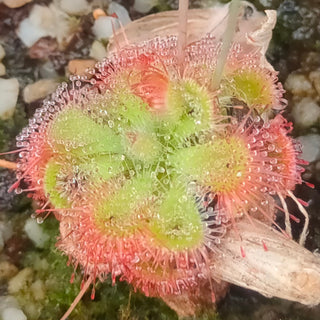Echinacea tennesseensis
TENNESSEE CONEFLOWER
- Unit price
- / per
Tennessee Coneflower (Echinacea tennesseensis) is native to the USA and recently removed from the federal endangered species list. Flat, pastel pink showy flowers with green and burgundy centers follow the sun like sunflowers. Attracts many butterflies and pollinators. Tennessee Coneflower's has an extensive taproot which makes it tolerant of dry sites.
Type: Hardy perennial
Hardiness zones: 4-9
Height: 24-30", 60-75cm
Location: Sun or part shade
Seeds per packet: 8
Sow just under the surface of the soil and water in. Leave them at room temperature for 6 weeks. This helps break the phytohormones which inhibit germination. They will not grow yet. Then a cooling period is required. Cover them with plastic and place in a fridge for 80 days. Be sure they stay moist. After the cold stratification period they are then brought back to a cool room (15-18C, 59-68F) for them to germinate. Germination can be erratic, generally 30-90 days after the warming period for most seeds, though some can take longer.
Echinacea tennesseensis
TENNESSEE CONEFLOWER
- Unit price
- / per
Multiple secure payment options available.
Adding product to your cart
You may also like
Tennessee Coneflower (Echinacea tennesseensis) is native to the USA and recently removed from the federal endangered species list. Flat, pastel pink showy flowers with green and burgundy centers follow the sun like sunflowers. Attracts many butterflies and pollinators. Tennessee Coneflower's has an extensive taproot which makes it tolerant of dry sites.
Type: Hardy perennial
Hardiness zones: 4-9
Height: 24-30", 60-75cm
Location: Sun or part shade
Seeds per packet: 8
Sow just under the surface of the soil and water in. Leave them at room temperature for 6 weeks. This helps break the phytohormones which inhibit germination. They will not grow yet. Then a cooling period is required. Cover them with plastic and place in a fridge for 80 days. Be sure they stay moist. After the cold stratification period they are then brought back to a cool room (15-18C, 59-68F) for them to germinate. Germination can be erratic, generally 30-90 days after the warming period for most seeds, though some can take longer.
















































